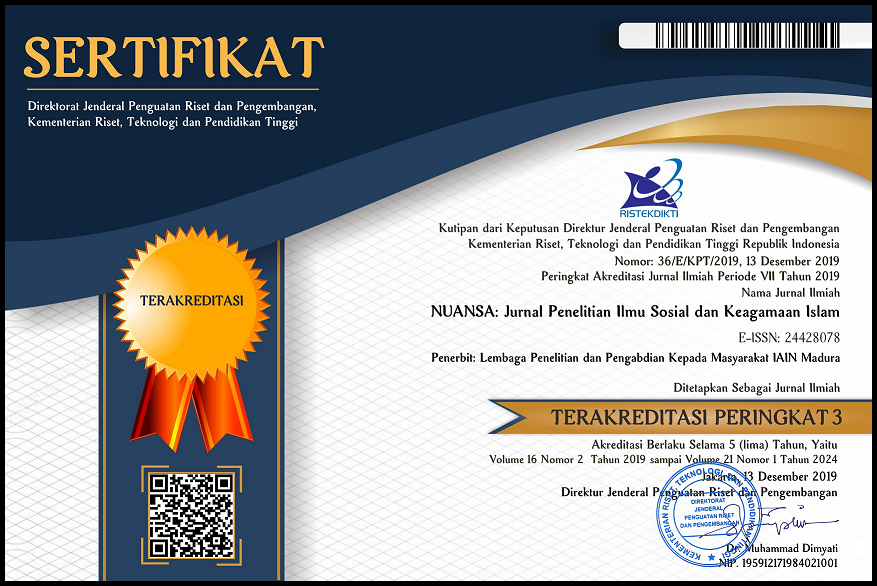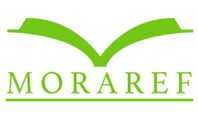Penguatan Karakter Dalam Pendidikan Sistem Persekolahan (Implementasi Perpres Nomor 87 Tahun 2017 Tentang Penguatan Pendidikan Karakter)
 Abstract views: 1572
,
Abstract views: 1572
,
 PDF downloads: 958
PDF downloads: 958
Abstract
Keberhasilan dan kegagalan peradaban suatu bangsa banyak ditentukan oleh karakter warga bangsanya. Oleh karenanya, pendidikan karakter menempati posisi tertinggi dalam prioritas pembangunan bangsa secara fisik material maupun secara psikis-spiritual. Lembaga pendidikan juga diberi amanat oleh negara untuk mendidik generasi bangsa dalam mewujudkan karakter warga bangsa yang unggul dan mapan. Termasuk di dalamnya lembaga pendidikan tingkat menengah di seluruh Indonesia. Untuk memperkokoh karakter warga bangsa, pemerintah menerbitkan regulasi berupa PERPRES Nomor 87 Tahun 2017 tentang Penguatan Pendidikan Karakter atau PPK. Penelitian ini bertujuan untuk mengungkap, mengidentifikasi, dan mendeskripsikan tentang kesiapan penyelenggara sistem persekolahan dalam pelaksanaan PPK; gambaran tentang pelaksanaan PPK pada sistem pesekolahan; problem pelaksanaan PPK dalam pendidikan sistem persekolahan; dan langkah-langkah solutif penyelenggara pendidikan dalam memecahkan problem pelaksanaan PPK dalam pendidikan sistem persekolahan. Penelitian ini menggunakan pendekatan dan metode kualitatif dengan orientasi teotetik fenomenologis untuk mengungkap dan mendeskripsikan fokur-fokus kajian. Lokasi penelitian ini di SMA Negeri 1 Pamekasan. Informan penelitian ini adalah guru, pimpinan sekolah, dan murid. Analisis data dilakukan secara kualitatif terhadap catatan lapangan. Analisis ini dilakukan pada saat dan setelah pengumpulan data dilakukan. Pengecekan keabsahan data dilakukan dengan 4 teknik, yaitu kredibilitas, dependabilitas, transferablitas, dan konfirmabilitas.
(The success and the failure of a nation’s civilization depends on the characteristics of its people’s character. Therefore, character building sets in the highest position in the priority of the nation’s development both material-physically and mental- spiritually. The nation also instructs the education institution to teach the students well in forming an excellent and proper citizen, including all senior high schools in Indonesia. In forming the citizen’s character, the government publishes the regulation of PERPRES no. 87 year 2017 about the strengthening of character building or PPK. The purpose of this research is to reveal, identify and describe the readiness of the organizer of schooling system in implementing PPK; the description of the PPK implementation in schooling system; the problems in implementing PPK in schooling system; and the solutions for the education organizer in solving the problems of PPK implementation in schooling system. The research uses the qualitative method and approach with theoretic phenomenological orientation to reveal and describe the research focuses. The location of this research is at SMAN 1 Pamekasan. The sources of data are the teachers, the principle, and the students. The data analysis to the field notes is done qualitatively. This analysis is done in the process of data collecting and afterward. The checking of data is done with four techniques; they are credibility, dependability, transferability and confirm ability.)
Downloads
References
Bogdan, R.C. & Biklen, S.K., Qualitative Research for Education: An Introduction to Theory and Methods (Boston: Allyn and Bacon, Inc., 1992).
Denzin, N.K. & Lincoln, Y.S., Handbook of Qualitative Research (Thousand Oaks, California: SAGE Publications, Inc., 1994).
Dimyati, M., Penelitian Kualitatif: Paradigma, Epistemologi, Pendekatan, Metode, dan Penerapannya (Malang: IPTI dan PPS UM, 2000).
Guba, E.G. & Lincoln, Y.S.. Toward a Methodology of Naturalistic Inquiry in Education (Los Angeles: Center for Study of Evaluation University of California, 1995).
Lincoln, Y.S. & Guba, E.G., Naturalistic Inquiry. Beverly Hills, CA: SAGE Publications, Inc., 1995), 15; Patton, M.Q., Qualitative Evaluation Methods. Beverly Hills, California: Sage Publications, Inc., 1994).
Kerlinger, F. N., Foundation of Behavioral Research, Seventh Edition, (New York: Holt Rinehart and Winston, Inc., 2006).
Koentjaraningrat, Metode-Metode Penelitian Masyarakat (Jakarta: PT. Gramedia, 1999), 44.
Lofland, J. & lofland, L.H. Analizing Social Settings: A Guide to Qualitative Observation and Analysis (Belmont, C.A.: Wadsworth Publishing, Co., 1994)
Miles, M.B & Huberman, A.M., Qualitative Data Analysis: A Sourcebook of New Methods. Beverly Hills: Sage Publication, 1996), 65; Bogdan & Biklen.
Moleong, L.J., Metodologi Penelitian Kualitatif (Bandung: PT Remaja Rosdakarya, 1990).
Nasution, S., Metode Penelitian Naturalistik Kualitatif (Bandung: Tarsito, 1998).
Permendikbud Nomor 23 Tahun 2017 tentang Hari Sekolah (Jakarta: Setjen Kemdikbud, 2017).
PERPRES Nomor 87 Tahun 2017 tentang Penguatan Pendidikan Karakter (PPK), Pasal 1 (Lembaran Negara RI tahun 2017 Nomor 195).
PP Nomor 19 Tahun 2005, Juncto PP Nomor 32 Tahun 2013, dan Juncto PP Nomor 13 Tahun 2015 tentang Standar Nasional Pendidikan.
Program kerja pada Kabinet Kerja Periode tahun 2014 2019: Rencana Pembangunan Jangka Menengah Nasional (Jakarta: Sekretariat Negara RI, 2014).
Spradley, J.P., Participant Observation (New York: Holt, Rinehart, and Winston, 1990).
Soetopo, H.B.. Penelitian Kualitatif dalam Pendidikan. Makalah Kuliah Umum Tidak dipublikasikan (Malang: Pusat Penelitian IKIP MALANG, 4 Februari, 1997).
Sonhadji K.H., A., Teknik Pengumpulan dan Analisis Data dalam Penelitian Kualitatif, dalam Imron Arifin (Ed.). Penelitian Kualitatif dalam Bidang Ilmu-Ilmu Sosial Keagamaan. Malang: Kalimasahada Press, 1994).
Soegianto, S., Desain dalam Penelitian Kualitatif. Makalah Disampaikan pada Penataran Dosen IKIP Surabaya. Makalah Tidak dipublikasikan. (Surabaya: Pusat Penelitian IKIP Surabaya, 20 Januari, 1999).
UNESCO, Rethinking Education: Towards a Global Common Good? (Paris: UNESCO Publishing, 2015), 17.
Undang-Undang RI Nomor 20 Tahun 2003 tentang Sistem Pendidikan Nasional, Pasal 3 (Jakarta: Sekretariat Negara RI, 2003).
The journal operates an Open Access policy under a Creative Commons Attribution-NonCommercial 4.0 International License (CC-BY-NC) 
Authors who publish with this journal agree to the following terms:
- Authors retain copyright and grant the journal right of first publication with the work simultaneously licensed under a Creative Commons Attribution License that allows others to share the work with an acknowledgement of the work's authorship and initial publication in this journal.
- Authors are able to enter into separate, additional contractual arrangements for the non-exclusive distribution of the journal's published version of the work (e.g., post it to an institutional repository or publish it in a book), with an acknowledgement of its initial publication in this journal.
- Authors are permitted and encouraged to post their work online (e.g., in institutional repositories or on their website) prior to and during the submission process, as it can lead to productive exchanges, as well as earlier and greater citation of published work.






















